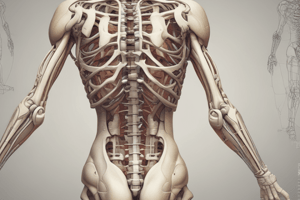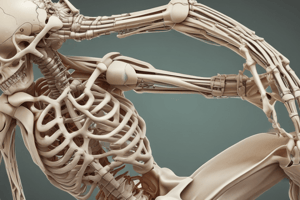Podcast
Questions and Answers
What is the term for bending at the waist to one side?
What is the term for bending at the waist to one side?
- Lateral rotation
- Medial flexion
- Lateral extension
- Lateral flexion (correct)
What type of movement involves the turning of a structure around its long axis?
What type of movement involves the turning of a structure around its long axis?
- Protraction
- Elevation
- Rotation (correct)
- Circumduction
What movement is described as moving a structure superiorly?
What movement is described as moving a structure superiorly?
- Depression
- Abduction
- Flexion
- Elevation (correct)
Which movement describes the action of gliding a structure in an anterior direction?
Which movement describes the action of gliding a structure in an anterior direction?
What is dorsiflexion?
What is dorsiflexion?
What is lateral rotation of the humerus primarily responsible for?
What is lateral rotation of the humerus primarily responsible for?
Which of the following movements would be classified as a special movement?
Which of the following movements would be classified as a special movement?
Which pairs of movements are classified as angular movements?
Which pairs of movements are classified as angular movements?
What characterizes hyperextension?
What characterizes hyperextension?
Which movement involves moving a structure in an inferior direction?
Which movement involves moving a structure in an inferior direction?
What is a characteristic of circumduction?
What is a characteristic of circumduction?
Which movement is an example of abduction?
Which movement is an example of abduction?
What does flexion specifically accomplish at a joint?
What does flexion specifically accomplish at a joint?
What is the purpose of extension?
What is the purpose of extension?
Which movement involves bringing fingers back together?
Which movement involves bringing fingers back together?
Which joints primarily allow for flexion and extension movements?
Which joints primarily allow for flexion and extension movements?
What is the primary function of the joint capsule?
What is the primary function of the joint capsule?
Which type of arthritis is characterized by gradual degradation of the articular cartilage?
Which type of arthritis is characterized by gradual degradation of the articular cartilage?
What characterizes a saddle joint?
What characterizes a saddle joint?
Which of the following joints is classified as a hinge joint?
Which of the following joints is classified as a hinge joint?
Which type of joint allows for rotational movement within a ring?
Which type of joint allows for rotational movement within a ring?
What defines a noninflammatory form of arthritis?
What defines a noninflammatory form of arthritis?
In rheumatoid arthritis, which of the following characteristics is true?
In rheumatoid arthritis, which of the following characteristics is true?
What is a key feature of cartilage in joints?
What is a key feature of cartilage in joints?
What type of joint movement occurs primarily at the proximal radioulnar joint?
What type of joint movement occurs primarily at the proximal radioulnar joint?
Which ligament is especially strong and supports the body's weight at the hip joint?
Which ligament is especially strong and supports the body's weight at the hip joint?
What is the primary reason for the limitation of movement in the elbow joint?
What is the primary reason for the limitation of movement in the elbow joint?
What does the olecranon bursa cover at the elbow joint?
What does the olecranon bursa cover at the elbow joint?
Which of the following joints performs flexion and extension?
Which of the following joints performs flexion and extension?
Which condition is associated with inflammation of the olecranon bursa?
Which condition is associated with inflammation of the olecranon bursa?
What is the structure located inside the hip joint that carries a nutrient artery to the femur's head?
What is the structure located inside the hip joint that carries a nutrient artery to the femur's head?
Which of the following accurately describes the knee joint?
Which of the following accurately describes the knee joint?
Which ligament is most likely damaged if a knee is hyperextended?
Which ligament is most likely damaged if a knee is hyperextended?
What condition is characterized by tearing of the medial collateral ligament, medial meniscus, and anterior cruciate ligament?
What condition is characterized by tearing of the medial collateral ligament, medial meniscus, and anterior cruciate ligament?
What is a common symptom of a torn meniscus?
What is a common symptom of a torn meniscus?
Which condition is associated with the accumulation of uric acid crystals in the joints?
Which condition is associated with the accumulation of uric acid crystals in the joints?
What is a common cause of bursitis?
What is a common cause of bursitis?
What is the function of the medial collateral ligament?
What is the function of the medial collateral ligament?
What type of injury involves movement of bones out of their correct alignment at a joint?
What type of injury involves movement of bones out of their correct alignment at a joint?
What is the primary cause of tendinitis?
What is the primary cause of tendinitis?
Flashcards are hidden until you start studying
Study Notes
Joints
- Help hold bones together while allowing for movement
- Made up of two or more bones
- Classified by structure, and type of movement they allow
Joint Classification by Structure
- Fibrous: Bones joined by fibrous connective tissue (ex: sutures in the skull)
- Cartilaginous: Bones joined by cartilage (ex: intervertebral discs)
- Synovial: Free moving joints, with a joint cavity, synovial fluid and articular cartilage
Synovial Joints
- Joint Cavity: Space between articulating bones
- Articular Cartilage: Covers the ends of bones to reduce friction
- Synovial Fluid: Lubricates and nourishes the joint
- Joint Capsule: Fibrous capsule that encloses the joint
- Ligaments: Bands of connective tissue that help strengthen the joint
Types of Synovial Joints
- Plane Joints: Flat or nearly flat surfaces glide over each other. (example: carpal bones in the hand)
- Hinge Joints: Uniaxial, allow movement in one plane (example: elbow and knee joints)
- Pivot Joints: Uniaxial, allow rotation around a central axis (example: articulation between the head of the radius and the proximal end of the ulna)
- Condyloid Joints: Biaxial, allow movement in two planes (example: metacarpophalangeal joints)
- Saddle Joints: Biaxial, allow movement in two planes, but have greater range of motion than condyloid joints (example: carpometacarpal joint of the thumb)
- Ball-and-Socket Joints: Triaxial, allow movement in all three planes (example: shoulder and hip joints)
Types of Movement in Synovial Joints
- Angular movements: Changes in the angle between bones
- Flexion: Decreases the angle between bones
- Extension: Increases the angle between bones
- Hyperextension: Extension beyond the anatomical position
- Abduction: Movement away from the midline
- Adduction: Movement towards the midline
- Circular movements: Rotation around an axis
- Rotation: Turning of a structure around its long axis
- Circumduction: Combination of flexion, extension, abduction, and adduction
- Special movements: Unique movements
- Elevation: Movement superiorly
- Depression: Movement inferiorly
- Protraction: Movement anteriorly
- Retraction: Movement posteriorly
- Pronation: Rotation of the forearm, so palm faces posteriorly
- Supination: Rotation of the forearm, so palm faces anteriorly
Specific Joints
- Shoulder Joint: Ball-and-socket joint
- Elbow Joint: Hinge joint with two types of movement: flexion/extension, and pronation/supination
- Hip Joint: Ball-and-socket joint; strong ligaments support it
- Knee Joint: Modified hinge joint; complex joint with medial and lateral menisci, cruciate ligaments
- Ankle Joint: Hinge joint
Disorders of Joints
- Bursitis: Inflammation of a bursa, causing pain around the joint
- Arthritis: Inflammation of the joints
- Osteoarthritis: Noninflammatory, gradual cartilage degradation
- Rheumatoid arthritis (RA): Inflammatory, affects connective tissue (skin, vessels, lungs)
- Gout: Increased uric acid crystals in tissues, including joint capsules
- Lyme disease: Inflammatory, can affect joints
- Bunion: Deformation of the first metatarsal (great toe), can include bursitis
- Tendinitis: Inflammation of tendon sheaths, often due to overuse
- Dislocation: Movement of bones out of alignment
- Sprain: Stretching or tearing of ligaments
- Chondromalacia patellae: Softening and degeneration of the cartilage on the underside of the kneecap
Studying That Suits You
Use AI to generate personalized quizzes and flashcards to suit your learning preferences.





